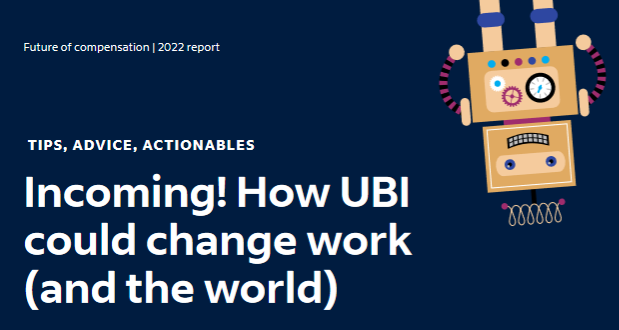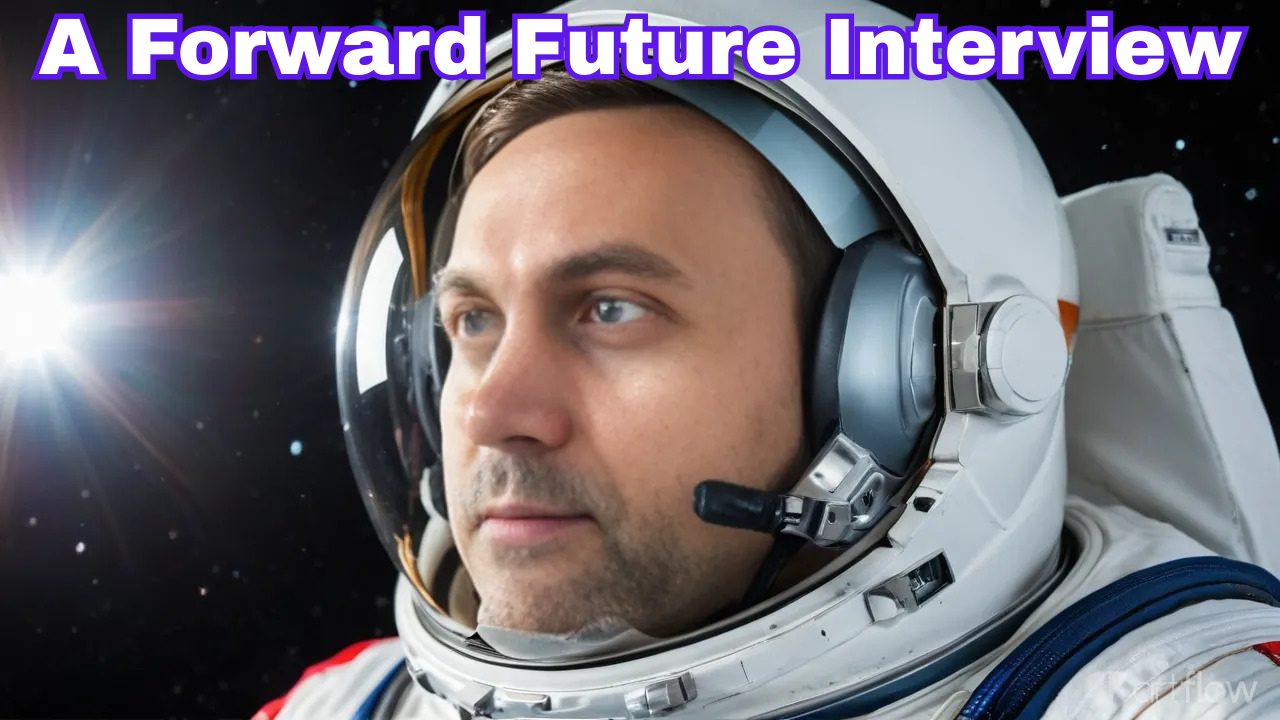Incoming! How UBI could change work (and the world)

The following is an excerpt from the 2022 report by Indeed titled "Future of compensation: Pay, benefits and equity in the UK workplace." This excerpt is based on an interview I did in August as part of the report's preparation.
The idea, of a universally provided amount of money, has been around for a long time. It’s just not always been known as basic income. Centuries ago, it existed as a concept. Then came a resurgence in the ’60s, with Martin Luther King and Milton Friedman. Even Nixon was talking about a basic income. His plan wasn’t a universal basic income, but it was partially disconnected from work, and would have greatly reduced the poverty of families—especially children.
Since then, basic income has been building upwards in knowledge and in support, albeit at a slow pace, with jumps. A big jump was when Switzerland first got the signatures to put it to a vote. Suddenly, a lot of people around the world heard about basic income for the first time. Interest went down a bit, and then Andrew Yang ran for president on basic income. That created another new surge, especially in the US, for the idea.
When COVID-19 hit, basic income was top of mind. All of a sudden, jobs were being shed, people had to get on unemployment, they had to go to food banks, and they realized the system isn’t really there for them. Then, at the same time, they started getting stimulus checks, and seeing how things could work entirely differently.
On the other hand I’m worried that, because inflation was a result of the pandemic, and Putin provided another huge supply shock, there’s now a confluence of events where blame happens. Regardless of inflation being global, and not tied to the amount of assistance in countries all around the world, that story is out there. I worry that might harm the case for basic income—or at least the potential for it happening soon.
Automation is such an interesting part of the story. There’s this fear that, I think, is a bipartisan fear. Yet people sometimes think that, if they’re not working next to a robot, or not losing their job, then maybe it’s not going to happen. The frustration is that we have been impacted by automation for decades—but it’s not so much that people are working next to robots, it’s that their wages are going down, relatively speaking. We really have been coring out the middle class, where highly-productive manufacturing jobs are being automated, globalized and off-shored first. What roles are left? For many people, the answer is lower-paying jobs, which means people have a harder time getting by.
The reality of automation is a harder story to tell—because it’s not in your face or full of robots. Since the ’70s, productivity has grown, but all the growth of the economy has gone to the top. Wages have been stagnant, and inequality has increased. It’s not that machines are generating mass employment; it’s that they're generating more inequality.
I want automation to happen. If a job can be done by a machine—especially if it can be done better, with higher quality or fewer resources utilized—I argue it should. With a basic income, humans can still do something that’s meaningful to them, whereas machines will be doing everything we can utilize them for.
I like to describe basic income as the power to say no and the freedom to say yes. When you provide people with this bargaining power, the onus is on the employer to incentivize that job. So it needs to pay enough, have good hours, good coworkers and a good environment to work in. It also helps if the work itself is valuable to the community, and not socially or environmentally disruptive.
The freedom to say yes might mean working for less money, or even working for free. You can choose to be a volunteer. You can choose to do unpaid care work. You can choose to be involved politically. You can choose to start a business, without the need for startup capital to provide a runway for you. Basic income provides flexibility in bargaining power for higher wages, the ability to work for less, and for jobs to actually reflect real meaning and purpose.
I think one of the biggest potentials is, actually, what David Graeber referred to as ‘bullshit jobs’. We’ve got all these jobs that don’t need to exist at all—they’re not adding to productivity, and are just excuses to provide a paycheck for some reason or another, be it bureaucratic, administrative or hierarchical. If people have a basic income that’s fully unconditional, they can actually say, ‘No, I’m not going to do that.' If the economy drains out unnecessary jobs, this will increase our capacity, and better utilize humans—so we can do the things we actually need to get done. Ultimately, we’ll get more done with less resources, which provides a counter-inflationary argument, as well as an environmental one.
People always ask, ‘Can we afford it?’, but what is it about what we’re doing now that’s free? Is poverty costless? Is insecurity and instability costless? Child poverty in the US costs over $1 trillion a year, so I think that that needs to be part of this. What is the actual cost of not doing basic income? If we do basic income, and see savings in healthcare, because people are healthier; we see savings in the criminal justice system, because people are doing less crimes; if we see higher productivity, because people are better matched to the jobs they’re doing—these are all savings, and a return on investment.
From my perspective, given all the arguments for and against, I feel the basic income is a right. You can’t do a right in a targeted way. You can’t say the rich don’t have the right to, say, public healthcare, or the right to public education. Why would they not have a right to a public income? Obviously, if rich people are getting a thousand dollars per month, you can just raise their taxes more than $12,000 per year. You can nullify what you’re providing them, but also make sure that ground is still underneath them, no matter what.
Back in 2013, I got into the idea of basic income through Reddit. It was a discussion that hit the front page, with thousands of people talking about how fast technology was advancing, and how no one was really talking about the implications.
I then read Manna, by Marshall Brain—a short novella that’s about the future, what changes we’ll want to make, and what could happen if we don’t make those changes. It really opened my eyes to the fact we’re facing this fork in the road, where things will get a lot worse, or a lot better. Things aren’t really going to stay the same. His solution was this idea of basic income, so I started looking into it.
The whole thing fascinated me. As I learned more about the idea—and also details of the existing status quo—I realized that this isn’t just an idea that needs to maybe happen in the future, because of automation, it really needed to have happened decades, if not centuries, ago. My belief became that I should put all my efforts into basic income, because it just seems like something that’s really important. And so I did. I became a moderator of the r/BasicIncome subreddit, then started writing about it, blogging about it and speaking about it. Along the way, I also crowdfunded my own basic income,via Patreon.
I started that process in late 2014, it took all of 2015 and, by the start of 2016, I had what I considered to be a full basic income underneath me, crowdfunded at a perpetual level. It meant I could focus on this full time, and that’s what I’ve been doing ever since.
The first thing that really hit me—which isn’t something you can absorb from books or studies—was when I was still in the process of the crowdfunding, and I knew I could count on having, say, $300 per month. It’s a very small amount, and so it shouldn’t really do anything. It doesn’t cover rent, and it’s not like you cannot work because you have $300. Yet I actually felt a great deal of security, in a whole new way. I felt that, if the worst things happen, I’m not going to starve—no matter what, I’ve got enough money for food.
Suddenly, I felt this level of security that I’d never really felt before, even when earning a lot more from a job, or self-employment. Just that knowledge that it’s going to be there made me feel something that I hadn’t felt before. It’s hard to describe, because so many people don’t know what that security feels like. That was the single biggest thing I learned—the security and unconditionality component. Whereas the actual amount didn’t matter nearly as much as people would expect.
You can read Indeed's entire report in full here.

Do you want more content like this? Please click the subscribe button and also consider making a monthly pledge to continue fueling my UBI advocacy work.
_large.jpg)
UBI Guide Newsletter
Join the newsletter to receive the latest updates in your inbox.

